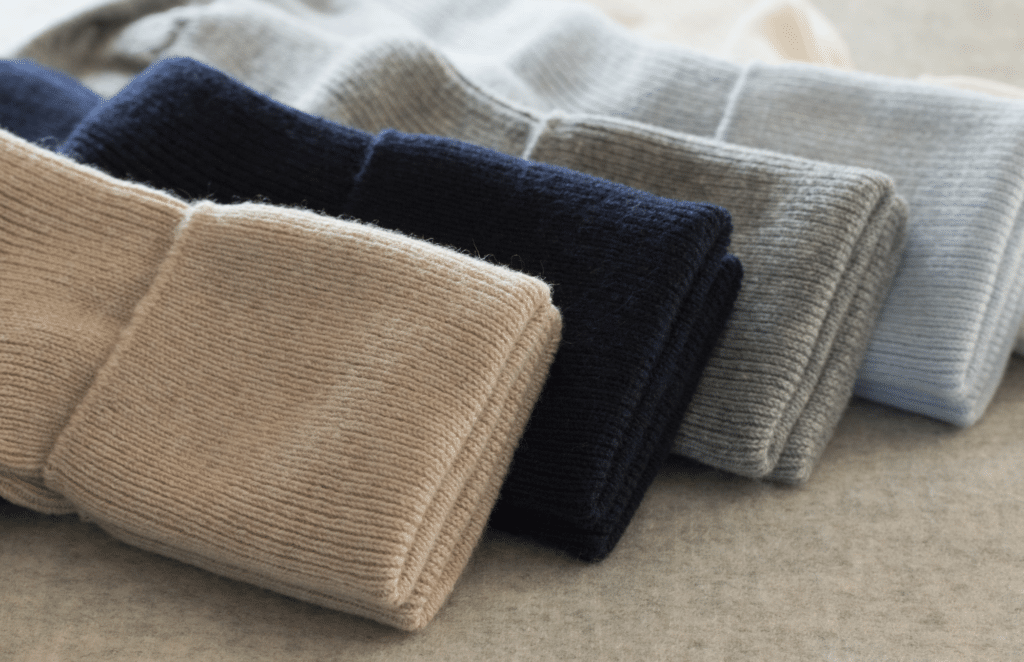Introduction – Ethical, Sustainable And Compostable Socks
Socks may seem like a small part of our wardrobe, but they can have a significant impact on the environment and the lives of workers who produce them. The fashion industry is notorious for its negative effects on the environment and exploitation of labor. By choosing eco-friendly, ethical, compostable and sustainable socks, consumers can make a difference in promoting sustainability and social responsibility in the fashion industry.

Impact Of Socks On Carbon Emissions
The impact of socks on carbon emissions is due numerous factors involved in the production, distribution, and disposal processes as follows:
Raw materials: Socks are commonly made from materials like cotton, polyester, nylon, and wool. The production of these materials generates carbon emissions through farming, chemical processing, and transportation. For instance, conventional cotton farming involves significant pesticide and water usage, while synthetic materials like polyester and nylon are derived from fossil fuels.
Manufacturing: The manufacturing process of socks, including spinning, knitting, dyeing, and finishing, requires energy and water, leading to carbon emissions. Energy-intensive processes like dyeing and finishing contribute to higher emissions, particularly if the energy comes from non-renewable sources.
Transportation: Transporting socks from manufacturing facilities to warehouses, retailers, and ultimately to consumers generates carbon emissions, especially if long distances are involved.
Washing and maintenance: Socks require regular washing, which consumes water and energy. Depending on the washing machine’s efficiency and the energy source, this can contribute to carbon emissions. Additionally, the use of non-biodegradable detergents may harm the environment.
Disposal: The disposal of socks at the end of their life cycle also has an impact on carbon emissions. If they end up in landfills, they may release methane, a potent greenhouse gas, as they decompose. The production of new socks to replace discarded ones also adds to the overall carbon emissions.
Given the numerous variables involved, it is difficult to provide an exact number for the impact of socks on carbon emissions. However, by choosing socks made from eco-friendly materials, manufactured through sustainable processes, and disposed of responsibly, consumers can help reduce their carbon footprint and contribute to a more sustainable fashion industry.
Ethical and Fair Trade Socks
Ethical and fair trade practices prioritize workers’ rights, fair labor conditions, and social responsibility in the production process. Supporting ethical and fair trade sock brands not only ensures that your purchase benefits those who made them, but also encourages other companies to adopt similar practices.
- Bombas: Bombas is a sock company known for its commitment to giving back. For every pair of socks sold, they donate a pair to homeless shelters across the United States. To date, they have donated over 50 million pairs of socks.
- Conscious Step: This brand produces socks with organic cotton and supports fair labor practices. Each collection of socks contributes to a specific cause, such as fighting poverty or promoting education, with a portion of the profits donated to partner organizations.
- PACT: PACT’s socks are made with organic cotton and produced in Fair Trade Certified factories. They prioritize transparency in their supply chain, ensuring ethical practices at every step.
When shopping for ethical and fair trade socks, look for certifications such as Fair Trade Certified or B Corp, which indicate adherence to social and environmental standards.
Sustainable and Eco-Friendly Socks
Sustainable and eco-friendly socks are made with environmentally friendly materials and production methods that minimize negative impacts on the environment, promote ecological balance, and support sustainable sourcing practices.

- Patagonia: Known for its commitment to sustainability and social responsibility, Patagonia produces socks made from recycled materials, such as polyester and nylon, and responsibly sourced merino wool. They also support various environmental initiatives and are a certified B Corporation.
- Organic Basics: This Danish brand uses organic cotton, recycled materials, and TENCEL Lyocell in their socks, which are produced in factories that follow strict environmental and social standards. Organic Basics also employs a carbon offsetting program and is dedicated to reducing water waste in production.
- Allbirds: Allbirds uses sustainable materials like TENCEL Lyocell and ZQ-certified merino wool in their socks. They are a certified B Corporation and have committed to becoming carbon neutral through reducing emissions and investing in carbon offset projects.
When selecting sustainable and eco-friendly socks, consider the materials used, the brand’s commitment to sustainable practices, and any third-party certifications.
Compostable Socks
Compostable socks are made from biodegradable materials that can break down naturally in a composting environment, contributing to waste reduction and a circular economy.
- ReSocks: ReSocks produces compostable socks made from bamboo fibers, which are naturally antibacterial and moisture-wicking. They are designed to decompose within three months in a home composting system.
- EcoSox: EcoSox uses sustainable bamboo fibers in their socks, which are not only compostable but also offer natural odor resistance and temperature regulation.
To properly care for and dispose of compostable socks, follow the brand’s guidelines and consider composting them at home or through a local composting program.
Shopping Guide for Responsible Sock Purchases
When shopping for eco-friendly, ethical, and compostable socks, consider factors such as the materials used, production methods, and the brand’s commitment to sustainability. Online stores like Made Trade and EarthHero offer a curated selection of sustainable and ethical sock brands, making it easy to find responsible options.
While sustainable and ethical socks may come at a slightly higher price point, it’s essential to consider the true cost of these products, including the environmental and social benefits they provide.
Conclusion – Sustainable Socks
As consumers, our choices can have a significant impact on the fashion industry. By opting for eco-friendly, ethical, and compostable socks, we can support brands that prioritize sustainability and social responsibility.
This not only helps reduce the negative effects of the fashion industry on the environment and society but also encourages other companies to adopt similar practices. Take the time to explore and support responsible sock brands, and play your part in promoting a more sustainable and ethical fashion industry.
